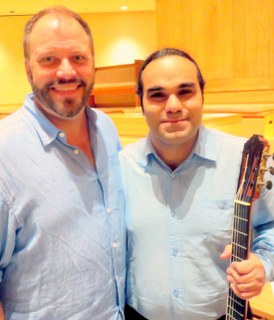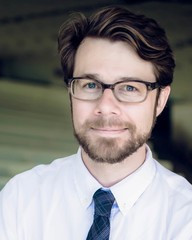|
Back
The Glory That Was Henze’s New York
St. Peter’s Lutheran Church, 54th Street and Lexington Avenue
09/11/2015 - & September 12, 2015
Hans Werner Henze: Kammermusik 1958
Cantata Profana (Producers): Thomas Cooley (Tenor), Arash Noori (Guitar), Jack Ashworth, Zou Yu (Violins), Colin Brookes (Viola), Hannah Collins (Cello), Patrick Duff (Bass), Gleb Kanasevich (Clarinet), Craig Hubbard (Horn), Darren Hicks (Bassoon)
Christopher Ash (Projection Design), Lee Dionne (Producer)

T. Cooley, A. Noori (© Sam von Doggenstein)
Poor Hans Werner Henze. All his life, this composer loved poetry and words and classical Greek culture and the political Left, and tried to write music into “something usable, something the Masses can understand.”
Yet inevitably for such a wondrous mind, his music was complex, mathematical, cerebral.
Listening to Henze is like viewing a Jackson Pollack painting and abruptly recognizing the most elegant patterns or discovering recognizable figures beneath the scratches and realizing how beautiful it can be.
He is rarely played in New York, and this is truly sad, since Henze’s Schoenbergian overtones hid an emotion, almost naive romanticism, a vividly passionate adoration of Greek classicism or–as was shown the performance last night (and tonight)–the convergence of madness and revelation.
It took Cantata Profana to realize that the chapel of the futuristic St. Peter’s Church on Lexington Avenue could be the ideal venue for a “staging” of Henze’s early Kammermusik 1958. As extraordinary as the music could be, and as inspirational as the poetry of the quite insane 19th Century poet Friedrich Höldlerin, Cantata Profana realized that a mere concert performance could only give Platonic shadows for Henze’s pictorial visions.
Had we been given a literal concert performance, one tenor, one guitarist, one string quintet, with clarinet, horn, and bassoon would sit on the stage and play the music. Concentrating, one could hear the beautiful lines (written for Peter Pears), the Renaissance chords of the guitar, and the almost unbearable beauty of the strings in the epilogue, music which Beethoven could have written for his last chamber music.
But Cantata Profana knew that Kammermusik needed far more. Their tenor, Thomas Cooley appeared shoeless in rolled-up trousers (was he a simple mendicant? Was he Socrates, barefoot in Athens?). He and guitarist Arash Noori walked from runners on one side of the stage to the musical consort and back again. As if attempting to show that Henze was not interested in static sounds, but needed physical embarkations.

C. Ash (© Courtesy of the Artist)
The visual power came not only with the musicians but the most vivid projections on the lofty angelic-white walls behind the stage. Alas, I have no pictures to show, so one can only assert that Christopher Ash projected a glorious panoply of orange sunrises, of a million birds flying over the sky, of seagulls as silhouettes, as barely moving shadows. His blues could be the sky or the sea, this giant carnations could turn red or blue. At a certain point, his abstractions looked like chromosomes splitting, or the earth turning blood-crimson.
Like Henze’s music, Mr. Ash at times illustrated the words literally but mainly they were symbolic, complements to the poetry and the melodies, varying between atonal and lyrical, with frequent allusions to Benjamin Britten.
Whatever Mr. Ash projected–whether the world as supernova or an over-exposed film of the most mundane lake–the pictures made the same kind of statement as the music. That is, no statement at all. Rather, a feeling, an emotion.
Resembling, in fact, the poetry of Höldlerin himself. He had been living in a tower for several years, and at the end, deposited his “nonsense poetry” with friends, later published as “In Lovely Blueness” With his reference to Asia, the poet may well have been familiar with Sufi poetry (which had been published in German several times), and his poetry had that same sense of irony, paradox and vision.
How did Henze handle such poetry? In 12 interlocking sections. His ensemble played a prologue and epilogue with atmospheric settings which echoed the orchestral fragments of Britten’s Peter Grimes (which Henze loved so much). Or guitarist Arash Noori would play three solo tentos, a 15th Century musical form like a ricercare. Obviously difficult but child’s play for Mr. Noori.
The words, though, were strung together by Thomas Cooley. Originally written for Peter Pears, Henze wrote lines which went to the extremes. As if he wanted his singer to be a counter-tenor or to exceed the usual compass, but didn’t dare to!
(Apparently, Peter Pears sent one section back to Henze, saying it was unsingable. It wasn’t and it isn’t.)
Mr. Cooley was up to the task. Known for his Baroque music, he gave these words not only emotional color but the dramatic emphasis with hands and arms.
And now we come to the music itself. I am tempted to request a ticket for this evening’s second performance, for it should be experienced several times. It is mysterious music, it rises from the mysterious depths of Hölderlin’s “wind” and “blue” and the strange shapes coming from the stairs of a belfry” to the glimmering comets, “with the quickness of birds, blossoming in fire...the purity as children’s”.
Henze’s music is dissonant but never acerbic. It is music exquisitely formed, with a gyroscopic variety of colors and textures. And so beautifully crafted that one rarely thought of the unique ensemble which created these sounds.
By the end epilogue, the string quintet with no voices or winds, played those sounds which the deaf Beethoven heard only in his mind for the Grosse Fuge.The projections were finished, the lights came on, and Henze’s vision of revelation, madness and inspiration turned into, yes, a Friday night in Manhattan.
In the meantime, he the Cantata Profana performers had transformed meanderings into vapor into illumination and, even at 9pm, the radiance of an imaginary Mediterranean island at sunrise.
Harry Rolnick
|